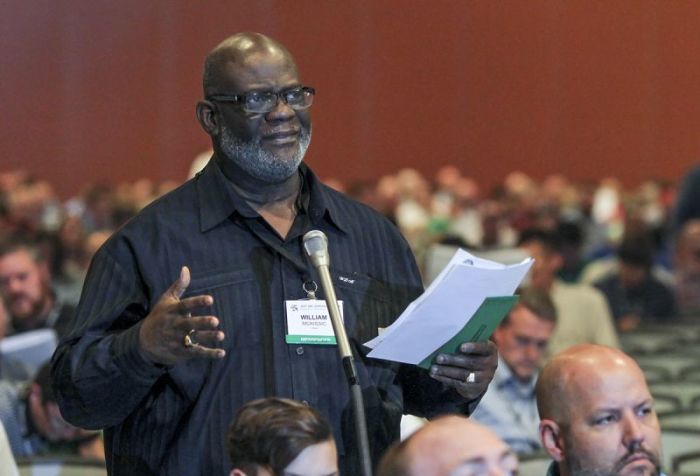Pastor Dwight McKissic: SBC fine with black members ‘on the front porch’

Dwight McKissic Sr., one of the Southern Baptist Convention’s most outspoken black pastors, appears likely to join an exodus of other high profile black pastors out of the nation’s largest Protestant denomination because he believes black members are only allowed “on the front porch” and he’s not optimistic about the future of race relations.
The idea behind the front porch relationship, he explains in an interview with Word & Way’s Brian Kaylor, is borrowed from a scene in Regina King’s new film “One Night in Miami,” currently available on Amazon, and which he recently viewed with his wife and adult children.
“One Night in Miami,” which was first released in 2020, is the story of a fictionalized meeting of Malcolm X, Muhammad Ali, NFL great Jim Brown, and celebrated singer Sam Cooke in a room at the Hampton House in February 1964, celebrating Ali's title win over Sonny Liston.
In the scene referenced by McKissic, Brown, played by actor Aldis Hodge, returns to his hometown in Georgia to meet with his friend, a white man named Mr. Carlton played by actor Beau Bridges. When he arrives at Mr. Carlton’s house, he is first greeted excitedly by Mr. Carlton’s daughter, Emily Carlton, played by Emily Bridges.
Both Brown and Mr. Carlton, who is an older adult, go on to have a warm and congenial conversation on his front porch until his daughter reminds him that he had some furniture to move inside the house. When the much younger and able Brown offers to help, Mr. Carlton surprising declines the offer, noting: “So considerate of you, Jimmy, but you know we don’t allow n***ers in the house, so it’s quite alright. It really is wonderful to see you, son. You keep up the good work. You do us all proud.”
That scene, says McKissic, perfectly describes the current relationship black members have with the denomination.
“They had a long front porch — a lot of chairs on it, a lot of places to rest food and plates and drinks. … You're welcome on the front porch, you can fellowship on the front porch, we can eat together, drink on the front porch, we can have great conversations on the front porch, but ‘we don’t allow n***ers inside our house,’” he said. “That’s kinda how I’m feeling about the SBC."

“We’ll let you sit out on the front porch. We’ll let you have a great conversation. We’ll even let you preside out on the front porch. Be president for a year on the front porch. But what we’re not gonna do is let you make policy, let you have a significant voice or any voice in a conversation about race … we’re not gonna let you inside the house,” said the Texas preacher.
Last month, McKissic, who currently leads Cornerstone Baptist Church in Arlington, cut ties with the Southern Baptists of Texas Convention after the organization’s leaders adopted a “strongly worded, anti-CRT policy that denounces all aspects of critical race theory.”
Critical race theory is described as a theoretical and interpretive mode that examines the appearance of race and racism across dominant cultural modes of expression. Through this framework, scholars seek to understand how victims of systemic racism are affected by cultural perceptions of race and how they are able to represent themselves to counter prejudice. Scholarship on the theory traces racism in America through the legacy of slavery, the civil rights movement and recent events.
The SBTC’s policy position came from a decision made by six members of the Council of Seminary Presidents in 2020 to reject CRT as incompatible with their faith while condemning “racism in any form” at their annualsession celebrating the 20th anniversary of the adoption of the revised Baptist Faith & Message.
McKissic also threatened to cut ties with the SBC if Resolution 9, which describes CRT as an analytical tool that can “aid in evaluating a variety of human experiences,” is rescinded at the SBC’s annual meeting this summer.
The issue, which has been controversial in evangelical circles and society at large in recent years, became a major political issue in 2020 when former President Donald Trump took a firm position against its promotion in federal agencies, describing it as anti-American.
In the Word & Way interview posted online Saturday, McKissic said because of the current cultural climate surrounding the issue, he was not optimistic Resolution 9 will survive in any meaningful way.
“To be honest, I’m not optimistic that things will change. Again, for political reasons, economic reasons, the Convention is likely to reverse the decision they made in 2019. If they don’t reverse it by rescinding it … they’ll maybe adopt a new resolution that’s radically different from Resolution 9 in 2019,” he said.
“They may in some way formally adopt the seminary presidents’ statement on critical race theory. I suspect that things will get worse than better. I think the statement that’s being made to us is that there will never be [human] equality and inclusion in SBC life,” he added.





























